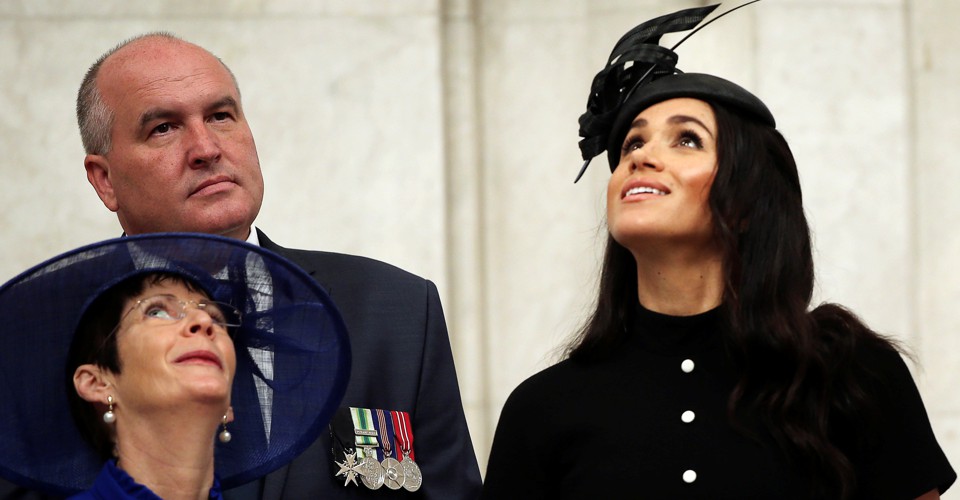Meghan Markle Can’t Be a Royal Radical - 4 minutes read
 Meghan Markle's Vogue Issue Shows the Limits of Radical Royalty
Meghan Markle's Vogue Issue Shows the Limits of Radical RoyaltyFor the cover, she chose 15 women—mostly models and actors, but also the author Chimamanda Ngozi Adichie and New Zealand’s prime minister, Jacinda Ardern—instead of posing herself. “The line-up is evidence that, in 2019, a new metric for global success is in play,” reads the un-bylined piece accompanying the shoot. “First, attract visibility. Then, convert visibility into a platform. Finally, use your platform to effect change.” Christy Turlington, one of the original supermodels, now oversees a charity tackling maternal mortality. Laverne Cox, who stars in Orange Is the New Black, is one of the world’s highest-profile transgender actors. Adwoa Aboah, who appeared on Enninful’s first cover as editor, has spoken about her drug use and suicide attempt as a way to spotlight mental health.
The September issue highlights the different approaches taken by Markle and her sister-in-law, Kate Middleton, the Duchess of Cambridge and future queen, to the global fame that comes from joining the British royal family. When Middleton was featured on British Vogue’s centenary-edition cover in 2016, she was styled almost as a parody of an English country aristocrat, wearing a tweed jacket and hat, and leaning on a gatepost in front of a wheat field. That now seems like an image from another era.
The spectacle of Middleton, the silent mother of princes, makes many feminists, including me, extremely uncomfortable. She looks “designed by a committee and built by craftsmen, with a perfect plastic smile and the spindles of her limbs hand-turned and gloss-varnished,” as the author Hilary Mantel once put it. Middleton has survived the tabloid storms by retreating into blandness. We get the best glimpse into her private world through the pictures she takes of her children, which regularly make the front pages of the newspapers.
This is a well-trodden path for consorts, both royal and political. Middleton is apparently happy, as Hillary Clinton derisively put it two decades ago when discussing her own ambitions, to “stay at home and bake cookies.” Markle is clearly not—and perhaps it was never an option anyway. She came to the royal family with a past: an acting career, an ex-husband, a public record of her opinions. During the 2016 presidential campaign, before she married Prince Harry, she called Donald Trump “divisive” and “misogynistic.”
Since joining the royal family, she has thrilled the British tabloids by offering them a new leading actress in the live-action version of The Crown. At the same time, she has confounded them by insisting on privacy when she wants it, a quietly radical notion in a country where the royals are expected to live in a virtual goldfish bowl. She did not appear on the steps of the hospital, hours after giving birth, as her sister-in-law did; her son Archie’s christening was a private ceremony; she and Harry moved out of Kensington Palace, walked past every day by tourists in central London, and retreated to Windsor, outside the capital.
Source: Theatlantic.com
Powered by NewsAPI.org
Keywords:
Meghan Markle • Vogue (magazine) • Chimamanda Ngozi Adichie • New Zealand • Prime Minister of New Zealand • Jacinda Ardern • Christy Turlington • Maternal death • Laverne Cox • Orange Is the New Black • Transgender • Adwoa Aboah • Substance abuse • Mental disorder • Catherine, Duchess of Cambridge • Catherine, Duchess of Cambridge • Elizabeth II • Celebrity • British royal family • Vogue (magazine) • Parody • English language • Aristocracy (class) • Sport coat • Feminism • Hilary Mantel • Tabloid (newspaper format) • Hillary Clinton • United States presidential election, 2016 • Prince Harry • Donald Trump • Misogyny • British royal family • British Empire • Tabloid journalism • Privacy • Goldfish • Infant baptism • Kensington Palace • Central London • Windsor, Berkshire •